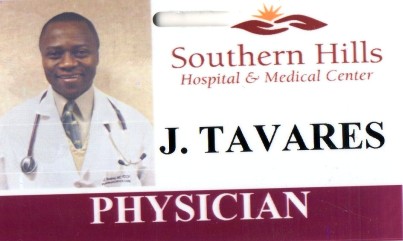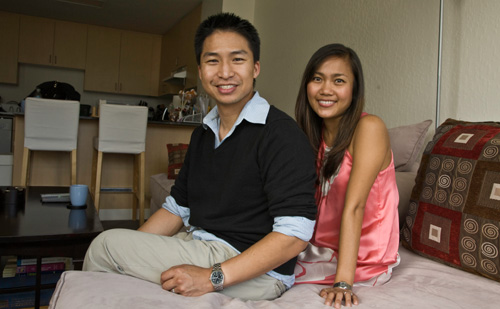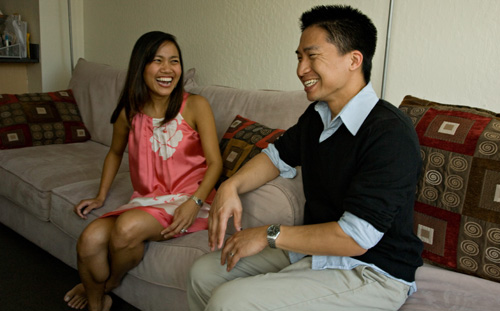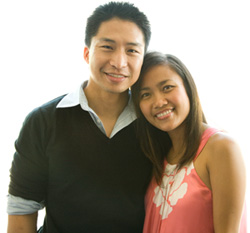 |
A SAÚDE DOS GUINEENSES NA GUINÉ E NA DIÁSPORA
 |
Prof. Joaquim Silva Tavares (Djoca)
01.07.2009
Editorial de Julho
Editorial de Julho
Há histórias que vale a pena contar!
Quando recebo emails de amigos, colegas e até desconhecidos Guineenses, tentando justificar o porquê de nunca terem ido mais além, de desistirem de realizar os seus sonhos de criança ou os “sonhos” dos pais: apresentam razões como: tive um problema de saúde, tive que trabalhar para tomar conta da família, etc., sempre penso nesta jovem brilhante, originária da Tailândia e que agora mesmo me acabou de enviar um email a pedir uma carta de recomendação para retomar o internato complementar;
Juntamente vai a carta que ela me enviou e o artigo do jornal contando a história do “sacrifício” do marido.
Há 2 ou 3 anos, tive o prazer de conhecer esta jovem, inteligente, brilhante, trabalhadora incansável e que na minha avaliação final, anotei que ela tinha um futuro brilhante e que ia triunfar largamente na vida; Para minha surpresa, uma colega minha que é nefrologista, no final do mesmo ano lectivo, disse-me que essa jovem ia desistir do internato complementar; fiquei surpreendido e em estado de choque; marquei um encontro com ela e afinal era verdade: sim ela ia interromper a especialidade porque tinha-lhe sido diagnosticada uma insuficiência renal crónica e se sentia física e psicologicamente no fundo do poço; dei-lhe algumas palavras de conforto e ofereci-lhe todo o meu apoio.
2 anos depois, hoje, 26 de Junho, recebo este pedido dela e um recorte do jornal da UCLA que gostaria de compartilhar com os leitores do Contributo.
NA VIDA, NÃO IMPORTA OS INFORTÚNIOS POR QUE TEMOS DE PASSAR, NÃO IMPORTA AS MONTANHAS QUE TEMOS DE SUBIR, NUNCA DEVEMOS DESISTIR DOS NOSSOS OBJECTIVOS.
A OUTRA LIÇÃO A TIRAR, NÃO MENOS IMPORTANTE: SE PUDERMOS, DEVEMOS DAR PARTE DE NÓS PARA QUE O NOSSO PRÓXIMO POSSA VIVER: TEMOS O DEVER DE AJUDAR PESSOAS A VIVER, NÃO O DIREITO DE TIRAR-LHES A VIDA: A VIDA É MUITO IMPORTANTE, CUSTA MUITO DAR A VIDA, NUTRIR UM SER HUMANO, PARA QUE QUEM QUER QUE SEJA SE ACHE NO DIREITO DE CEIFAR ESSA VIDA… TEMOS QUE MUDAR ESTE TIPO DE COMPORTAMENTO NA NOSSA TERRA; NÃO SE PODE VIVER COMO ANIMAL SELVAGEM, EM RISCO DE EXTINÇÃO E AUTODESTRUIÇÃO, A NÃO SER QUE VENHA ALGUÉM DE FORA A DAR-NOS O ESTATUTO DE “ESPÉCIES PROTEGIDAS” PARA EVITAR A EXTINÇÃO DO HOMEM/MULHER GUINEENSE.
Uma outra história que queria compartilhar convosco é a de um jovem cabo-verdiano: em 1996, recebi uma chamada do Dr. Francisco Gaspar dos Santos (Chico Fos) a perguntar-me se não me importava que desse o meu número de telefone a um amigo dele de Cabo Verde; na altura, esse jovem, João Moreno Tavares disse-me que tinha passado os exames para vir a entrevistas aqui nos hospitais dos Estados Unidos; ele tinha feito o curso de medicina no Porto; queria cartas de recomendação; 2 anos depois, tinha conseguido um lugar na Brown University em Rhode Island, tirou a especialidade de medicina interna e depois a de doenças infecto-contagiosas;
Há 3 meses, uma colega minha de doenças infecto-contagiosas, perguntou-me se conhecia alguém com essa especialidade, porque queriam contratar mais um indivíduo; pus-lhe em contacto com o João e ele veio para uma entrevista aqui em Las Vegas na semana passada (finalmente, depois de mais de 10 anos, tivemos a oportunidade de nos encontrarmos); claro que falamos muito das nossas terras: ele vai sempre a Cabo Verde; Contrariamente, a última vez que estive na Guiné foi quando o meu pai faleceu (1991-1992); não que não queira ou me falte vontade, mas é pena dizer isso, apavora-me ir à Guiné (não reconheço esta Guiné que se está a autodestruir desde 1974 e que piorou desde 1998) ….
E nesta semana da morte do Michael Jackson, as minhas preces vão com o pai Joe Jackson (por algum tempo, vou sentir a falta da companhia dele nos meus joggings matinais, ele a caminhar, eu a correr) e com a mãe dele, Kathryn Jackson que, de vez em quando, cruzamos caminho no supermercado do meu bairro.
Por coincidência, umas palavras sobre o médico pessoal do Michael que agora está rodeado de controvérsias: as reviravoltas da vida: em 1999, quando cheguei a Las Vegas, ele também tinha acabado de chegar e falávamos sempre de fazer o melhor para os nossos doentes, de África, das Caraíbas, etc. Depois, foram quase 6 anos sem nos vermos ou falarmos, e foi um choque para mim ver a imagem dele na televisão (Não pode ser! É o Conrad Murray?); Por vezes, somos apanhados nas engrenagens da vida… Desejo-lhe sorte e coragem…
Se alguém tiver um plano, uma ideia em como podemos ajudar as nossas crianças a começar o ano lectivo a tempo, ter materiais didácticos à disposição, etc., ainda estamos a tempo de fazer algo (núcleos de indivíduos adoptando uma escola ou um grupo de alunos das escolas por onde passaram e acompanhá-los até acabarem o Liceu; somente uma ideia).
Ainda vamos falar de um caso clínico interessante, que não sei se devia colocar na secção da “Mulher”.
Por último, uma palavra de louvor e admiração aos colaboradores do Contributo: todos estão ajudando, com textos ou comentários, a criar uma nova mentalidade Guineense: discutir ideias, fomentar o poder das ideias e não as ideias do poder (como alguém recentemente mencionou); E ao incansável e incomparável Didinho, pelo extraordinário trabalho que tem estado a fazer…
Djoca!
|
From: Kanapa
Kornsawad Dr.Tavares, My name is Kanapa (Kana) Kornsawad, and I was an Internal Medicine resident at UNSOM, Las Vegas from June 2006-January 2007. I had the chance to work with you in September 2006 on the intensive care unit, during which I had gained much experience and clinical skill. Unfortunely, I had to resign from the residency program due to health issues. I have since moved to San Francisco with my husband , who is currently a Pediatric Nephrology fellow at the University of California, San Francisco. In the meantime, I have been working as a Research Coordinator in the Division of Pediatric Nephrology at UCSF. I recently received a kidney transplant from my husband, and my post-operative course has gone very well, so I have decided to re-apply for residency so that I may complete my training. As part of the application process, I have to obtain at least 3 letters of recommendation. Therefore, I am asking for your help in fulfilling this requirement. If there is any information regarding my past residency training that you feel is necessary, please do not hesitate to contact me by phone or by email. Thank you very much for your time. Sincerely yours, Kanapa Kornsawad |
|
Monday, June 22, 2009 In Sickness and in Health: UCSF Clinical Fellow Donates Kidney to Ailing Wife
Daniel Ranch, MD, a pediatric nephrology fellow at UCSF, donated one of his kidneys to his wife of five years, Kana Kornsawad, MD, a research coordinator who, like Ranch, works in the Nephrology division of UCSF Department of Pediatrics. As a pediatric nephrology fellow at UCSF, Daniel Ranch, MD, has witnessed time and again the transformative power of a donated kidney. On April 28, he traded his lab coat for a hospital gown and gave one of his own kidneys to the person who already has his heart: his wife of five years, Kana Kornsawad, MD. “I had always been an advocate for organ donation, and I knew the risks and benefits, so it was easy to make a decision very quickly,” said Ranch, 34, who had watched his wife’s health decline slowly but steadily since she first discovered blood in her urine in 2000. “I was very tired a lot and I had a lot of muscle cramps,” said Kornsawad, 35, a research coordinator who, like Ranch, works in the Nephrology division of UCSF Department of Pediatrics. “By the end, I couldn’t even wake up in the morning.” Kornsawad, whose kidney function had been weakening for years, had been warned that a transplant would eventually be necessary. But it was only when her kidneys reached a certain level of deterioration in mid-2008 that her doctors began performing the extensive medical tests that showed she and Ranch were a viable organ match. “With the shortage of donors, it’s always good if you can find someone you know who’s a match,” Ranch said. Nearly 80,000 people in the United States — including more than 16,000 in California alone — are currently on the waiting list for a kidney transplant, according to the US Department of Health and Human Services. Ranch, who had held off registering as an organ donor in order to “save” his kidney for his wife, said he “didn’t have to think twice” about going through with the procedure, even though it would be his first time in the hospital as a patient.  The couple, who first met in medical school in Thailand, was admitted to UCSF Medical Center on a Tuesday. Ranch was home by Thursday, with Kornsawad joining him the following day. Testament to Transplant Team“It’s really a testament to the great work they do here at UCSF,” Ranch said of the top-quality care the pair received from a team that included lead transplant surgeons Peter Stock, MD, PhD, and Chris Freise, MD, and kidney transplant coordinator Melissa Danko, RN. In 2008, UCSF celebrated its 45th year of transplantation, with more than 10,000 successful operations under its belt. Kidney transplants comprise about 80 percent of transplant procedures at the medical center, making it the world leader in kidney transplantation. In addition, the hospital is currently the nation’s second-largest center for living-donor kidney transplants. Kornsawad said the first two weeks after surgery were “really tough,” but she had ample help from Ranch and her mother, who traveled to San Francisco from Thailand to care for her daughter and son-in-law. One month after the transplant, the large bowl of prescription pill bottles in the couple’s kitchen was the only outwardly visible sign that anything had taken place. Kornsawad must take multiple immunosuppressive medications to avoid infection and prevent her body from rejecting the new organ. “She hasn’t felt this well in two or three years,” Ranch said of his wife, who has since returned to work and is in the process of applying to residency programs in internal medicine — a career goal her illness had threatened to derail.  Of course, Ranch and Kornsawad realize that the kidney transplant is a treatment, not a cure. From the time of surgery, the typical kidney transplant lasts 10 to 15 years, Ranch said, and that timeline can be much shorter if patients fail to take their medication. Ranch said he hopes the day will soon come when new treatments such as stem cell therapy offer a longer-term solution to his wife and the many others suffering from kidney disease. Such innovations could very well originate at UCSF, which has long been on the cutting edge of stem cell research and in 2010 will open a research building on the Parnassus campus entirely devoted to the field. “That’s our hope — that 10 to 15 years from now, there will be a whole new set of options out there,” Ranch said. Photos by Susan Merrell Related Links:
With Thousands in Need of Transplants, UCSF Intensifies
Efforts to Promote Organ Donation
UCSF Celebrates 45th Anniversary of Transplant Service |
ESPAÇO PARA COMENTÁRIOS PARTICIPE!
VAMOS CONTINUAR A TRABALHAR!
Projecto Guiné-Bissau: CONTRIBUTO